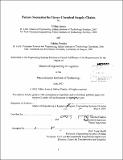| dc.contributor.advisor | Shardul Phadnis. | en_US |
| dc.contributor.author | Arora, Vibhu, M. Eng. Massachusetts Institute of Technology | en_US |
| dc.contributor.author | Putcha, Sekhar | en_US |
| dc.contributor.other | Massachusetts Institute of Technology. Engineering Systems Division. | en_US |
| dc.date.accessioned | 2013-09-24T19:42:15Z | |
| dc.date.available | 2013-09-24T19:42:15Z | |
| dc.date.copyright | 2013 | en_US |
| dc.date.issued | 2013 | en_US |
| dc.identifier.uri | http://hdl.handle.net/1721.1/81091 | |
| dc.description | Thesis (M. Eng. in Logistics)--Massachusetts Institute of Technology, Engineering Systems Division, 2013. | en_US |
| dc.description | Cataloged from PDF version of thesis. | en_US |
| dc.description | Includes bibliographical references (p. 53-54). | en_US |
| dc.description.abstract | We live in an age where industrial chemicals are central to the modem economy serving as the basis for all man-made fibers, life-science chemicals and consumer products. Owing to globalization, the industry has grown to extend its presence all over the world. Given the heavy manufacturing base and large distribution networks, the underlying supply chains are a critical component for the chemical industry. The chemical industry is capital intensive and most strategic decisions taken by firms in this industry have long-term impacts. As such, any uncertainty in the environment that affects these strategic decisions in supply chains needs to be understood before committing to the assets. In particular, sustainability related concerns have risen in importance in the past decade, and are likely to be important in the next decade (and beyond). In this thesis, we use scenario planning to understand the impact of sustainability related factors on Chemical supply chains for the year 2025. Using the literature in the field of long-range planning for the chemical industry, supply chain sustainability and scenario planning, and interviews with several experts in industry and academia, we developed three scenarios that we feel will be most applicable to understand the implications of a rather ambiguous issue of "sustainability" for chemical supply chains. Each of the three scenarios offers our end users -planners in the corporate supply chain strategy group - a framework to think about a complete and consistent set of world views regarding sustainability in which the industry must thrive. | en_US |
| dc.description.statementofresponsibility | by Vibhu Arora and Sekhar Putcha. | en_US |
| dc.format.extent | 65 p. | en_US |
| dc.language.iso | eng | en_US |
| dc.publisher | Massachusetts Institute of Technology | en_US |
| dc.rights | M.I.T. theses are protected by
copyright. They may be viewed from this source for any purpose, but
reproduction or distribution in any format is prohibited without written
permission. See provided URL for inquiries about permission. | en_US |
| dc.rights.uri | http://dspace.mit.edu/handle/1721.1/7582 | en_US |
| dc.subject | Engineering Systems Division. | en_US |
| dc.title | Future scenarios for green chemical supply chains | en_US |
| dc.type | Thesis | en_US |
| dc.description.degree | M.Eng.in Logistics | en_US |
| dc.contributor.department | Massachusetts Institute of Technology. Engineering Systems Division | |
| dc.identifier.oclc | 858276664 | en_US |
